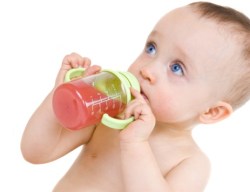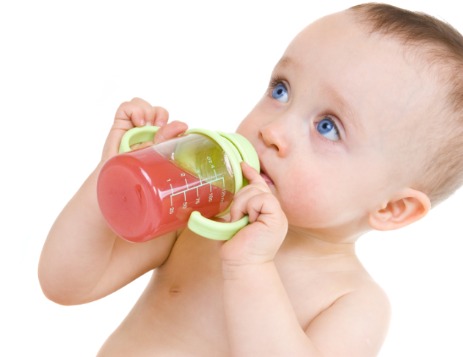
Drink up, kid.
Good news for opponents of bisphenol-A, the chemical that’s been linked to “mammary and prostate cancer, genital defects in males, early onset of puberty in females, obesity,” and more. Linked in rodents, the Food and Drug Administration is quick to note, declaring that it’s cool for people to ingest.
Unless you’re a baby! From CBS News:
The controversial chemical BPA, or bisphenol-A, can no longer be used in manufacturing baby bottles or sippy cups, the Food and Drug Administration announced Tuesday.
“Consumers can be confident that these products do not contain BPA,” FDA spokesman Allen Curtis said in a statement, adding that the agency’s action was based on the bottle industry’s phase out of the chemical. “The agency continues to support the safety of BPA for use in products that hold food.”
Wow! Bold step! What prompted the FDA to buck an industry that’s already given $4.7 million in Congressional campaign contributions in 2012?
The U.S. chemical industry’s chief association, the American Chemistry Council, had asked the Food and Drug Administration to phase out rules allowing BPA in such products in October, after determining that all manufacturers of bottles and sippy cups had already abandoned the chemical due to safety concerns.
Oh. Thanks, I guess?
Advocates have called for the FDA to take the ban further. From the Environmental Working Group:
The FDA’s action, while a positive step, will have little impact on children’s health. A consumer revolt and state-level legislation have already driven BPA from baby bottles and sippy cups. However, the epoxy coating that lines infant formula cans and most other aluminum food cans sold in the U.S. does contain BPA. The chemical leaches readily into liquids it touches.
CBS documents some of BPA’s demonstrable effects in its article:
Recent research has linked BPA to behavioral problems in human children. A study last October in Pediatrics found pregnant moms with the highest levels of BPA in their urine were more likely to have daughters who were more aggressive, hyperactive, anxious or depressed. No behavioral effects tied to BPA exposure were seen in boys.
A study published in yesterday’s issue of Pediatrics tied BPA found in newer tooth fillings to a slightly elevated risk of behavioral problems in kids such as depression and anxiety.
Hopefully, the chemical industry will remove BPA from all of its products so that the FDA feels comfortable banning it entirely. Until then, try not to be a rodent.



